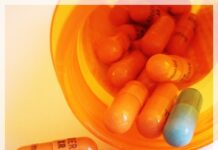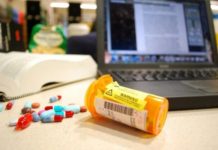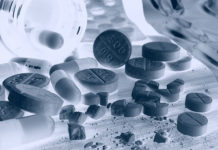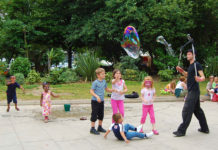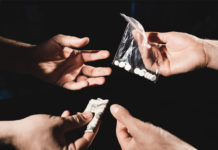The ADHD Drug Epidemic: Addiction, Abuse, and Death
A new analysis of FDA data, published on September 10th by the Milwaukee Journal Sentinel/MedPage Today, reveals the dangers of the common prescription of...
Book Review: “Overmedicated and Undertreated”
A former pharma executive has broken ranks with the industry in a new book by reporting how multiple psychiatrists, schools, and his desperate hopes pressed him to allow higher and higher doses of antipsychotic medications. The result: his 15-year-old son's death from Seroquel.
ADHD: The Hoax Unravels
At the risk of stating the obvious, ADHD is not an illness. Rather, it is an unreliable and disempowering label for a loose collection of arbitrarily chosen and vaguely defined behaviors. ADHD has been avidly promoted as an illness by pharma-psychiatry for the purpose of selling stimulant drugs. In which endeavor, they have been phenomenally successful, but, as in other areas of psychiatry, the hoax is unraveling.
What if ACEs (Adverse Childhood Events) Were the Basis of Mental Health Treatment?
What would happen if the mental health system fully recognized the pervasive and profound impacts of trauma on their clients? How might a deeper appreciation of the multi-faceted sequelae of childhood maltreatment and toxic stressors reshape mental health services? While the implementation of trauma-informed care in mental health programs has made significant inroads, the dominant bio-reductionist model continues to constrain and undermine progress.
Stimulant Drugs Have Adverse Effects on Cognitive Functioning in Healthy Students
Study of students without an ADHD diagnosis finds that stimulants (Adderall) have little impact on cognitive performance.
The Real Attention Deficit Disorder
The fact that we shame people for acting like they need attention (and for actually needing attention) is self-defeating and maddening, not to mention absurd. Living in a society that punishes people for having fundamental needs like attention is probably one of the reasons people have developed behaviors “just” to “get attention.”
ADHD: A Return to Psychology
Attention Deficit Hyperactivity Disorder (ADHD) has become the province of geneticists, neuropsychologists, and physicians. The prevailing view is that ADHD behaviors are caused by a neurobiological delay and that treatment must include medication and stringent management. While this general attitude may continue to prosper, there is increasing concern that we are proposing the existence of a medical problem when there are no biological markers or dysfunctions that reliably correspond with the behavioral criteria. It is vital that we more closely examine traditional beliefs about ADHD and review the shortcomings of commonly used treatments.
Rates of ADHD Diagnosis and Prescription of Stimulants Continue to Rise
Two new articles find that rates of ADHD diagnosis and stimulant prescription continue to rise all over the world.
“The Overdiagnosis of ADHD”
The general theme, that various "mental illnesses" are being "overdiagnosed" is gaining popularity in recent years among some psychiatrists, presumably in an effort to distance themselves from the trend of psychiatric-drugs-on-demand-for-every-conceivable-human-problem that has become an escalating and undeniable feature of American psychiatric practice. But the implicit assumptions – that there is a correct level of such labeling, and that the label has some valid ontological significance – are emphatically false.
Are We Discovering More ADHD?
This is an important issue. According to Centers for Disease Control and Prevention (CDC), the percentage of children with an ADHD diagnosis continues to increase, from 7.8% in 2003 to 9.5% in 2007 and to 11.0% in 2011. The CDC also notes that the base rates for ADHD varies substantially by state ranging from a low of 4.2% in Nevada to a high of 14.8% in Kentucky.
Evidence for Chile’s School-Based Mental Health Program
Chile’s Skills for Life (SFL) program, the largest school-based psychosocial intervention program in the world, has demonstrated improved behavioral and academic outcomes for elementary students identified as “at risk.” A team of Chilean and U.S. researchers assessed the SFL program and will publish their results in the October issue of the Journal of the American Academy of Child & Adolescent Psychiatry (JAACAP).
Baseball’s ADHD “Epidemic”
8% of major league baseball players have been diagnosed with ADHD (double the rate in the general population) and prescribed stimulants; medications which are...
The ADHD Diagnosis is a War of Semantics, Waged on Children
Since I am new on Mad in America, I will tell you; my mission is to debunk the ADHD diagnosis. My goal is to add common sense to a world where drugging kids for acting like kids is all the rage. When discussing ADHD with concerned adults I share how little is required to earn a diagnosis of ADHD. Learning just how non-scientific the diagnosis actually is, for many, is a shocking discovery.
Advancing the Use of Safe and Effective ADHD Treatment Options
The American public has come to view ADHD drug treatment as a rather benign option for common behavioral and academic issues. A recent report by the Centers for Disease Control and Prevention indicates that 14% of American children receive a diagnosis of ADHD before the end of childhood. Rates of diagnosis and treatment vary by geographic region. In some communities rates of treatment are much higher than the national average. By most any reasonable measure, the number of children who are medicated under the guise of ADHD is out of bounds. Current levels of ADHD drug treatment are unsafe for individuals and society.
What Does an 800 lb Gorilla in the Room Say at an ADHD Conference? ...
This blog is a little different than my normal. I want to tell you about an inspiring ADHD conference I took part in last week and a band of 800 lb. gorillas who gently shared the obvious with adults just wanting the facts when it comes to ADHD. First, if you didn't know, October was ADHD awareness month. Yes, according to www.ADHDawarenessmonth.org, a website sponsored by Shire Pharmaceuticals (the philanthropic makers of Adderall and Vyvanse) and supported by a large collection of non-profit groups (e.g., CHADD) conveniently supported by the profits of many other ADHD-focused pharmaceutical companies, October was the month to celebrate awareness of ADHD. October was the month to learn more about the ADHD stimulant drugs so often prescribed. Move along folks… nothing to see…no conflict of interest here.
Enough is Enough Series, #5 – The ADHD Fiction is Exposed. The French Have...
The time has come that the fictitious ADHD qualifies for my ‘Enough is Enough’ series. It’s time to stop addressing pharmaceutical psychiatry on its own terms: its fraudulent and corrupt 'science,' its spurious 'evidence base,' and its imaginary psychiatric ‘diseases.’ I’m done with this. The evidence is in. Let’s get real. Psychiatry has become a profession of drug pushers. As a psychiatrist I am beyond troubled. Let’s get real.
‘ADHD’ and Dangerous Driving
In former times, children who were routinely inattentive and impulsive were considered to be in need of training and discipline. By and large, school teachers and parents provided this. In fact, the training was usually provided before the matter even became an issue. Today these children are spuriously and arbitrarily labeled as ill, and are given pills. At the present time the pharma-psychiatric system is being widely exposed as the spurious, destructive, disempowering fraud that it is. Organized psychiatry is responding to these criticisms not by cleaning up its act, but instead by increasing its lobbying activity in the political arena.
Antipsychotics Associated with High Risk of Death in Children
A new study has found that children and adolescents taking a high dose of antipsychotics are almost twice as likely to die of any cause than children on other types of medications.
School Culture May Contribute to Overdiagnosis, Study Finds
Officials at a school that was more focused on ADHD diagnoses described children’s behavior in terms of individual illnesses, taking children out of the context of their social interactions, race, gender, and socioeconomic status.
“You Keep Giving Adderall to my Son, You’re Going to Kill Him”
The New York Times, in an extraordinarily lengthy front-page article, chronicles the descent of popular college class president, athlete, and aspiring medical student into...
Violence, Depression in Parents Linked to Kids’ ADHD, Depression
A prospective study of 2,422 children from 2004 to 2012 found that children whose parents reported Intimate Partner Violence (IPV) and depressive symptoms were...
Majority of Youth Prescribed Antipsychotics Have No Psychiatric Diagnosis
The majority of children, adolescents and young adults prescribed antipsychotic medications have not been diagnosed with a mental disorder, according to a recent study published in JAMA Psychiatry.
Connecticut Fails to Meet Deadline on Sandy Hook Mental Health Bill
The problem with instituting sweeping, costly and invasive mental health legislation is that there always are unintended consequences. The State of Connecticut, when passing Public Act 13-3, apparently didn’t consider that there are two sides to every story. And when it comes to “mental health” there most definitely is another side beyond the mental health we-need-early-intervention-to-help-those-suffering mantra.
Why Some Children with Depressed Parents Show Resilience
Children of parents who suffer from depression have a severely heightened risk of mental health problems, but new research points to several factors that seem to strengthen young peoples’ resilience and predict good mental health.
Warning to Parents: Psychiatry is How Kids Get High and Die in the USA
Street drug dealers and stimulant-peddling doctors both get clients high and addicted for profit. So there is really no difference between what they do except that doctors are more ‘successful’ at it, since they enjoy many advantages over illicit dealers and can get away with doing it legally.

